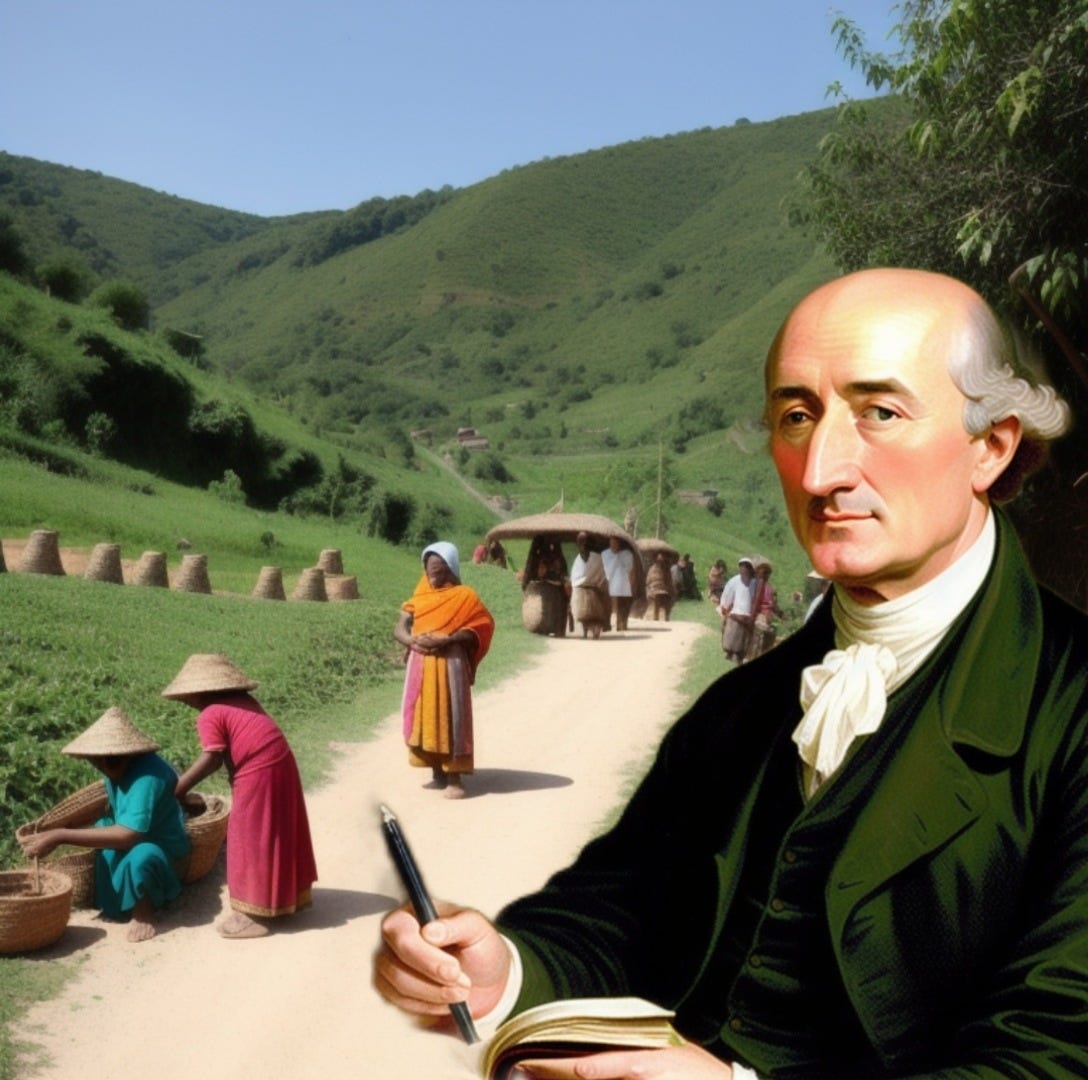Nations By Consent - Part IV: The Anarcho-Capitalist Model
Murray Rothbard presents the “pure anarcho-capitalist model” as a theoretical guidepost for desired outcomes, even when working within a statist framework. Simply put, “that no land areas, no square footage in the world, shall remain ‘public’; every square foot of land area, be they streets, squares, or neighborhoods, is privatized.”
But even here, Rothbard seems to face credible dissent from fellow market anarchist Roderick T. Long, who splits the difference between “public property” controlled by the “organized public” - thus, an organized state as represented by government officials - and by the “unorganized public” - thus, “property that the public at large was deemed to have a right of access to, but without any presumption that government would be involved in the matter at all.”
Take, for example, the proprietary communities open to the general public for commerce, as expounded upon by Spencer MacCallum. But Long furthers his case, stressing that “Lockeans… typically hold that individuals have a property right to any goods that they receive by voluntary transfer from their legitimate owners.”
Consider a village near a lake. It is common for the villagers to walk down to the lake to go fishing. In the early days of the community it's hard to get to the lake because of all the bushes and fallen branches in the way. But over time, the way is cleared and a path forms—not through any centrally coordinated effort, but simply as a result of all the individuals walking that way day after day.
The cleared path is the product of labor—not any individual's labor, but of all of them together. If one villager decided to take advantage of the now-created path by setting up a gate and charging tolls, he would be violating the collective property right that the villagers together have earned.
These examples may seek to enhance - rather than detract - Rothbard’s proposal when properly weighed. The semantics involved should by now be properly sorted out by the distinctions Long has provided, and both would presumably find this theoretical amendment worth contemplating.
It may be disputed, however, that the “collective property right” of the villagers is subject to denial or recognition by the private individual owners of the properties the path was created on. After all, their labor was presumably tied to the resources of another property owner. Whether that work was done in vain ultimately rests on the property owners' decisions. Each portion of the path is ultimately a “secondary claim” similar to a sandcastle at a privately-owned beach.
Long offers several other proposals that follow Lockean recognition, but likewise, they must reckon with claims of individual property ownership.
The presumed goal of a political philosophy is to avoid and resolve forseable conflicts. A property rights system aims to establish coherent boundaries and avoid a situation with competing rights claims. If this situation should arise, its theories and axioms should shed light on which claim holds the most weight.
For example, Stefan Kinsella has written and spoken extensively against “intellectual property rights” and their conflicts with tangible, material property claims.
Like intellectual property, Long's “unorganized public property” - for as helpful as the distinction aims to be - finds itself divorced from the Lockean model, instead of serving to expand it.
In addition to Long's argument, Rothbard’s anarcho-capitalist model contributed to the inspiration of Robert Murphy's market anarchist blueprint, Chaos Theory, as well as Hans Hermann-Hoppe's vision of covenantal societies in Democracy: The God That Failed.
Camp of the Saints
As the Cold War came to a close, it was revealed that ethnic Russians were encouraged to emigrate to Estonia and Latvia by Joseph Stalin with the intent of destroying their languages and cultures. For Rothbard, it was the “Camp of the Saints” problem coming to life, in reference to Jean Raspail’s novel under that title, in which the author envisions the entire population of India moving into France.
If life imitated art in ways that were no longer deemed absurd, it was time for Rothbard to reconsider his views on immigration. As he put it, “[a]s cultural and welfare-state problems have intensified, it became impossible to dismiss Raspail’s concerns any longer.”
Previously, we examined the relationship between culture and property in The Uninvited Caretaker, which was largely an outgrowth of Rothbard’s conclusions on immigration, as stated in this essay.
Culture is not property, strictly speaking. However, it can be expressed and codified in contract. The private sphere of society consists of a large body of contracts for every resident among the population. This would satisfy the assumption that culture is intertwined with the legal system.
Language is also not strictly a matter of private property, but bears significant status in the interpretation of law. This extends to practically every legal school of thought, as judges may explore the meaning of language employed from the time a law is written to its modern usage.
Both culture and language consist of norms and customs of social recognition. They are the end products of peaceful association, voluntary cooperation, and spontaneous order. As demonstrated here, both extend significantly into the legal system, and it would be foolish to assume otherwise.
Thus, with or without directly codifying culture and language into a legal theory, these subjects will still have a place in society, even in the “thin-libertarian” proposal of a social order strictly defined by private property.
Enclaves and Exclaves
Rothbard was awe-inspired to witness the decomposition of Yugoslavia into its constituent nationalities, but recognized Bosnia's potential for conflict. His solution: further decentralization.
But this of course will result in a large number of enclaves, parts of nations surrounded by other nations. How can this be solved? In the first place, the enclave/exclave problem exists right now.
Nagorno-Karabakh is a landlocked region in Armenia that continues to face ongoing blockades due to its residing territory. Fateful as this situation was, and still is, Rothbard confidently insisted privatization would lead to much-needed access rights coming to fruition.
Under total privatization, of course, these problems would disappear. Nowadays, no one in the U.S. buys land without making sure that his title to the land is clear; in the same way, in a fully privatized world, access rights would obviously be a crucial part of land ownership. In such a world, then, Karabakh property owners would make sure that they had purchased access rights through an Azeri land corridor.
Ryan McMaken of the Mises Institute wrote an article critical of public accommodation laws, largely highlighting the historical tendency of marginalized ethnic groups to use enclaves to build tight-knit communities in order to launch their prosperity.
Rather than blindly credit the government for their advancements, McMaken stresses the pivotal role of the parallel economy:
Does anyone seriously believe that Japanese-Americans attained higher levels of income and social-economic status than whites because Congress mandated that private businesses seat them at lunch counters? A far more believable explanation is that the roots of success of Japanese-American entrepreneurs existed long before the 1960s. This was all done, by the way, in spite of widespread government restrictions on these activities. Private discrimination was hardly the largest problem facing Japanese-Americans in the 20th century.
Similarly, with Latino groups, poverty alleviation was accelerated not by mandates that shopkeepers serve coffee to Mexican-Americans. Far more likely is the fact that, impelled by refusals to provide services by some Anglos, Mexican-American entrepreneurs built up their own social and economic institutions which — like Goya Foods — grew beyond the bounds of their own ethnic groups over time.
Citizenship and Voting Rights
Rothbard viewed the modern Anglo-American model of automatic citizenship as a grave flaw in a society where such citizenship status confers a right to vote. Such a system “clearly invites welfare immigration by expectant parents… whose babies, if born on American soil, automatically become citizens and therefore entitle themselves and their parents to permanent welfare payments and free medical care.”
The French system, in contrast, requires one to be born to a citizen to obtain automatic citizenship, and therefore “is far closer to the idea of a nation-by-consent.”
In a fully privatized society as Rothbard envisioned, voting would mostly be reserved to matters of corporations, joint-stock companies, and various private clubs. If dissatisfied with the direction of such a club, the freedom to leave and join another was a great virtue to be embraced. More privatization and decentralization ultimately negated the supposed importance of voting in such a society.
This vision understandably leaves the Rothbardian underwhelmed by the touting of “democracy” and “voting rights” in the present system.
In the modern world, democracy or voting is only important either to join in or ratify the use of the government to control others, or to use it as a way of preventing one's self or one's group from being controlled. Voting, however, is at best, an inefficient instrument for self-defense, and it is far better to replace it by breaking up central government power altogether.
Previous Installments:
See Also:
External Resources:
Nations By Consent by Murray Rothbard
A Plea for Public Property by Roderick T. Long
The Trouble with "Public Accommodation" by Ryan McMaken






